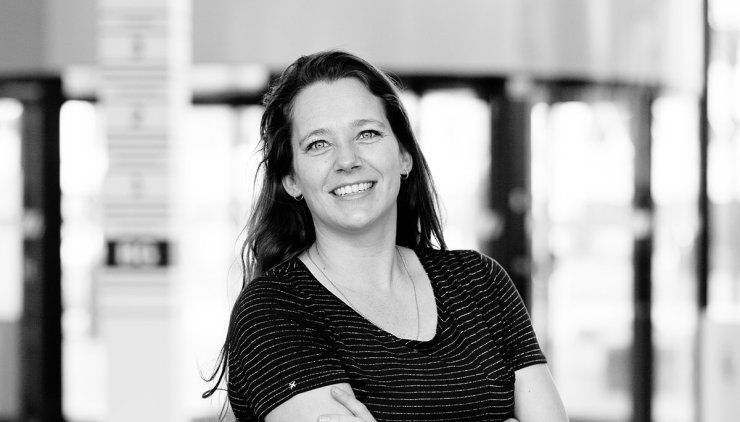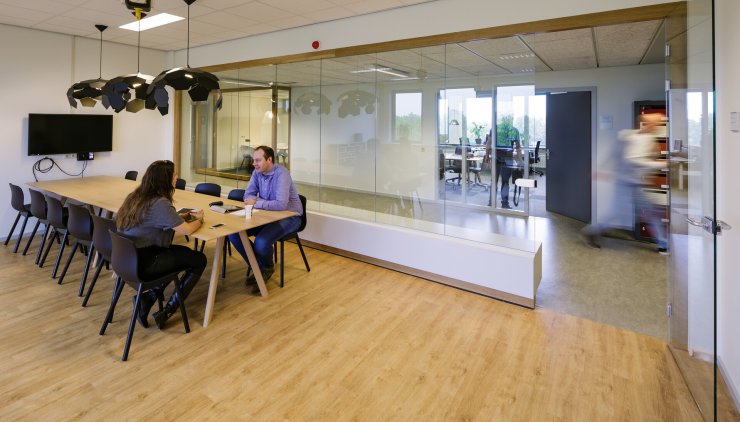-
30 juni
What has already succeeded from the Fontys for Society strategy? Is Fontys achieving its ideals?

Together with Martijn Derksen, Annemarie van den Broek led the sessions. Both are both teachers and members of one of the former strategy groups that supported the vision (and have now transitioned into the direction groups). Annemarie tells how the sessions went.
But first: why did you choose the Appreciative Inquiry method?
'We wanted to know how things were going with the various change tasks from the Fontys for Society strategy. This can be done via a document survey, and that is what is being done, but we also thought it would be a good idea to ask staff and students themselves.
People who are really dissatisfied often already make themselves heard, we thought. That is why we chose the Appreciative Inquiry method. In this method you identify what is going well and what is needed to do things better. You can build on that. [text continues after photo]

The sessions always started with in-depth interviews between two participants, which they later presented to the group. This way you really get to know people, their motives and what they find really important. Limits and obstacles we encounter also come to the surface.
We spoke with a nice reflection of Fontys, I think. People from the services and institutes, teachers, support staff and managers, as well as some students. Sometimes a director joined us. This combination of people made great conversations.'
What were you told?
'Participants indicated that the way we are organised does not always match the desired educational innovation. For example, because our organisation is strongly organised in institutes, which does not always make it easy to cooperate across institutes. Or, for example, the systems we use for assessment. These do not always match the more open forms of education.
Both students and docents felt it is important that there is sufficient attention to personal development. Who are you and what are your talents? That's what it's all about. Also that Fontys takes inclusion and diversity into account.
There are also opportunities in the cooperation between the professional field and education, the interviews revealed. And just as with educational innovation, you then also get to hear that the set-up of our organisation and our learning environments do not always match up well with ideals and that we are still too internally focused in this respect. For example, because work field partners have to create a guest account to give feedback to students in Canvas.
Another example is that some programmes are already very good at connecting with each other vis-à-vis the business community, while others operate from their own programme. Whereas, for companies in the region, it doesn't matter at all which study they are dealing with exactly. They just want to work with Fontys.
In Venlo, some attendees initially reacted with disappointment that the college board was not present. Somewhere in the institute's internal communication, this suggestion had been made, but this was a misunderstanding. Eventually, a good conversation ensued there, too, and we heard, among other things, a fine example of how one of the Venlo study programmes cooperates with the business community. And the desire to cooperate more with the economics courses.'
And, how ís the interim situation?
'It doesn't happen automatically, but that there is definitely support for the Fontys for Society strategy. We also heard that they still find the underlying documents too global and that we have to flesh them out together. But the strategy does give direction and the participants were happy with that. That fact is important, because if you falter once, you need to know you are on the right path. Otherwise, you quickly make a retreat.
I myself love innovation, for me it can't happen fast enough. But I also understand that for a large organisation like Fontys, things cannot go that fast. Moreover, at the beginning of the new strategy, we also had to deal with the corona period, during which the entire organisation was in survival mode. But I see that a movement has started and that there is a lot of willingness at both departments and institutes to take steps forward.'
